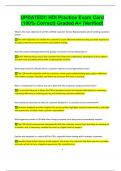UPDATED!! HDI Practice Exam Card
(100% Correct) Graded A+ |Verified|
What is the main objective of an HDI-certified Customer Service Representative when handling customer
issues?
The main objective is to resolve the customer's issues efficiently while ensuring a positive experience
through professional communication and problem-solving.
How does active listening enhance the quality of customer service interactions?
Active listening helps ensure the customer feels heard and understood, allowing the CSR to address
the root issue accurately and provide an appropriate solution.
What steps should a CSR take when a customer reports a recurring technical issue?
The CSR should empathize with the customer, review past troubleshooting steps, gather additional
information, escalate if needed, and follow up to ensure the issue is resolved.
Why is it important for a CSR to stay up to date with the company's products and services?
It is essential because it allows the CSR to provide accurate and relevant information to customers,
improving efficiency in resolving queries and enhancing customer satisfaction.
How would you describe the value of customer feedback in a customer service environment?
Customer feedback provides insights into service quality, highlights areas for improvement, and helps
refine processes to better meet customer expectations.
What approach should a CSR take when facing a complex issue they cannot immediately resolve?
The CSR should communicate transparently with the customer, assure them that they are working on
a solution, and, if necessary, escalate the issue to a higher level of support.
Explain why empathy is a critical skill for CSRs, especially when dealing with frustrated customers.
Empathy helps defuse tension, builds rapport, and shows the customer that their concerns are taken
seriously, which can turn a negative experience into a positive one.
1
,In what ways can a CSR demonstrate professionalism during every customer interaction?
Professionalism can be demonstrated through clear communication, active listening, maintaining a
positive attitude, adhering to company policies, and consistently delivering high-quality service.
How does understanding a customer’s expectations influence the way you handle their issue?
Understanding expectations allows the CSR to tailor the solution to the customer’s needs, ensuring
satisfaction and potentially exceeding expectations.
What is the importance of time management in a CSR role, and how can poor time management affect
customer service?
Time management ensures that customer issues are handled efficiently, reducing wait times and
improving overall service quality. Poor time management can lead to delays, frustration, and lower
customer satisfaction.
How should a CSR handle a situation where a customer demands a service that the company does not
offer?
The CSR should politely inform the customer that the service is not available, explain why, and offer
alternative solutions or suggestions that align with the company’s capabilities.
What actions should a CSR take to follow up with a customer after resolving their issue?
The CSR should reach out to confirm that the issue has been resolved to the customer’s satisfaction,
thank them for their patience, and offer further assistance if needed.
Why is it important for CSRs to manage their emotions during difficult customer interactions?
Managing emotions is important to maintain professionalism, avoid escalating the situation, and
ensure that the customer receives a calm, solution-oriented response.
What are the advantages of providing proactive customer service, and how can it reduce the number of
support requests?
Proactive customer service anticipates and addresses potential issues before they become problems,
reducing the need for customers to seek help and enhancing customer loyalty.
2
, How should a CSR prioritize multiple customer requests when they arrive simultaneously?
The CSR should assess each request based on urgency, impact, and complexity, then address the
most time-sensitive or critical issues first while keeping other customers informed about the status of
their inquiries.
What should a CSR do if a customer’s problem has been escalated multiple times with no resolution?
The CSR should review the escalation history, identify any gaps in communication or troubleshooting,
and work closely with higher-level support teams to ensure a final resolution is reached.
Why is maintaining an up-to-date knowledge base critical for CSRs?
A well-maintained knowledge base provides CSRs with quick access to accurate information, which
helps them resolve customer issues more efficiently and improves the overall quality of service.
What should a CSR do when they receive unclear or incomplete information from a customer about an
issue?
The CSR should ask clarifying questions to gather all necessary details, ensuring they fully understand
the problem before attempting to resolve it.
Explain how a CSR can ensure that their communication is clear and effective when handling technical
issues for non-technical customers.
The CSR should use simple, jargon-free language, provide step-by-step instructions, and confirm that
the customer understands each step before moving on.
What is the role of documentation in customer service, and how can it improve future interactions?
Documentation ensures that all details of the interaction are recorded, which helps other team
members follow up, prevents duplication of efforts, and contributes to a more efficient resolution
process in future interactions.
How should a CSR respond if a customer is dissatisfied with the service provided, despite following all
procedures correctly?
The CSR should empathize with the customer, offer an explanation of what was done, and explore
alternative solutions or escalate the issue if necessary to ensure customer satisfaction.
3




